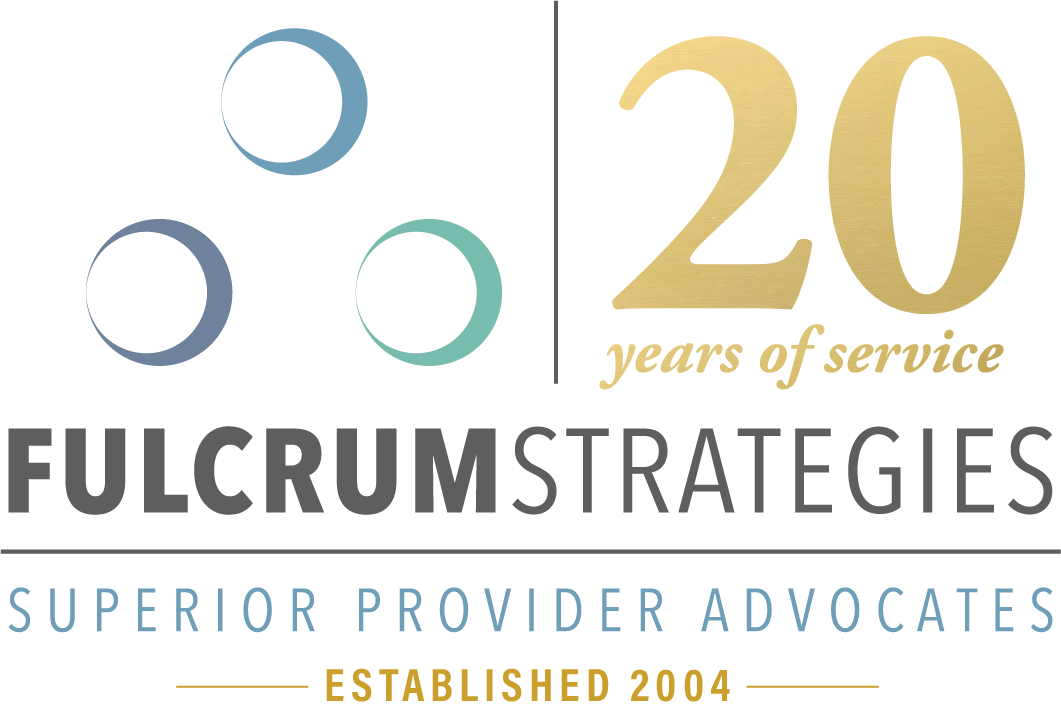Our Services
Contract Negotiation
Managed care companies come to the negotiation table with highly skilled negotiators who are trained to make sure that physicians are paid as little as possible for the services they provide. They know that physicians and practice managers simply don’t have the time to fully understand the intricacies of the contracts they are signing. At Fulcrum Strategies, our goal is to help physicians to succeed in the business of healthcare. We can determine if you are getting fairly reimbursed from the payers, or if there is potential for better rates and contract language. Our team, skilled in contract negotiation strategies, will handle all of your managed care contract negotiations. You maintain complete decision-making control throughout the entire process while we do all of the work.
Before we take on a new client, we want to get a realistic picture of the group’s situation. We look at things that could help or hurt future negotiations – for example; local competition, any unique aspects of the group, and contract language and rates. If we don’t think we can help a particular practice, we don’t want to take their money. To determine if we can help, we will perform a complimentary data analysis of your contract rates. We will ask you to provide us with a utilization report of your top codes with volume and fee by payer, along with the contracts themselves. From the hard data, and our knowledge of the various payers’ practices, we will normalize your contracts to a single year of Medicare so they can be compared accurately to each other, and allow us to identify which contracts can be improved. From there, we will determine how much money could be available if you were to engage Fulcrum Strategies to renegotiate your contracts.
“You don’t get what you deserve – you get what you negotiate!”
When a group decides to become a client, we’ll draft up Consulting Agreement for your review. Once signed, we begin the negotiation process. We use the previous analysis we performed to organize a “plan of attack.” We recommend which contracts should be negotiated first and predict what the likely outcomes will be. This is a collaborative process and we always defer to the client's wishes. As negotiations proceed, the client is updated as often as they wish. Once the documents are finalized, we keep images of all contracts in our database for future reference. For our clients’ peace of mind, we maintain a calendar of all contractual renewals for as long as the client remains with us.
Alternative Payment Negotiations
The healthcare landscape is changing – especially with regard to how physicians are paid and who pays them. Today, healthcare professionals are being bombarded with new terms like: Accountable Care Organizations, Patient Centered Medical Home, Tiered Networks, Episode of Care, Shared Savings and Pay for Performance, to name a few. Physicians and medical practice managers who don’t fully understand these new payment models could unknowingly sign unfavorable contracts and incur substantial revenue losses.
Now more than ever, you need a trusted ally at your side – someone who has your best interest in mind and who understands these new approaches to reimbursement methods. Fulcrum Strategies is uniquely suited to be your best advocate in these difficult and complex negotiations. At Fulcrum Strategies, our team of former insurance professionals will make sure you are protected before you enter into one of these new agreements. We can help you to understand the frequent changes that are taking place, how they will impact your practice, and how these changes can be tailored to actually benefit your practice.
Contact us today to discuss how we can help with contract negotiation services.
Mergers and Acquisitions
At some point most independent medical practices are faced with the question of merging, acquiring, or being acquired by another group or a hospital system. During these times, and given the importance of these decisions, it is helpful to have someone in your corner who can provide honest advice, guidance, evaluation, and analysis for your group. Fulcrum Strategies has extensive experience navigating these confusing waters and can help you make the best decision for your group and the situation at hand.
We offer consulting and assistance in several areas:
- Black Box analysis and revenue pro-forma development for potential mergers
- Evaluation of purchase offers
- Strategic evaluation of payer reaction to merger opportunities
- Evaluation of current payer contracts that could impact merger timing and effectiveness
- Representation and assistance in deal negotiation
Black Box
A “Black Box” analysis is one of the first major steps that guides groups from the theoretical “what if we did this” stage, and leads them down the path of merger or acquisition. Essentially, it answers the question “will this be good for my group?” Fulcrum will gather data and contract documents from both groups and produce a comparison that indicates whether it’s financially advantageous for one group to be acquired by another. To perform the analysis, we would need:
- Utilization from the group to be acquired. If the groups are considering an “even” merger, utilization data would be needed for both practices to determine whose contracts would be the best for the combined entity.
- Contracts or fee schedules from both groups to produce a weighted review of your financial terms with your commercial payers.
Once the analyses have been completed, both parties to the proceedings will be presented with a statement indicating what the net revenue change would be if one group came under the other’s contracts. All revenue is combined to form a single number to prevent violating any of the individual contract’s confidentiality clauses.
Further items for consideration are the assignment clauses from your contracts, hospital stipends if applicable, and opportunities for increased operational efficiency from common infrastructure.
- Most commercial contracts contain language that prevents practices from simply absorbing another group and adding them to their (higher paying) contracts. The insurance company must agree to add the new physicians to the contract roster of the existing group – and most of the time they will not do so. The newly added physicians will remain on their existing contract with that payer, if they have one, even after their old organization has ceased to exist. Not until that old contract is eligible for termination do the new doctors have an opportunity to be joined to the higher-paying contracts of their new employers. And, the payers don’t even have to allow it then. They can technically leave those new physicians as non-participating after they terminate their old agreement. It doesn’t happen often, but it’s a possibility that does sometimes happen.
- For hospital-based groups, any stipends paid to them need to be included in the black box analysis. If the two have very different levels of financial support from their hospital, transferring from one practice to another could cost more than is made up for by the higher-paying commercial contracts.
- To the extent possible, infrastructure should be included in your considerations, since it forms the backbone of your daily functioning as a practice. Especially easy, or difficult, integration should be reviewed. New licenses and/or user fees for the acquired group could undo a slim advantage in contract rates.
Hospital Based Physician Consulting
Hospital based physicians face a very uncertain future. No Surprises legislation threatened to hand your financial future over to payers who are incentivized to reduce your practice’s revenue to bolster their own profits. The original law that was finally passed offered physicians a reasonable path to keep predatory insurance companies from simply offering terrible rates and walking away, knowing doctors had no recourse. The most recent interim final ruling, produced by the Secretary of Health and Human Services, reverses that progress and once again delivers the futures of hospital-based physicians into the hands of the payers.
- We can help you analyze and explore options contained within your hospital contracts, drawing upon our decades of experience working with physicians, facilities, and the payers.
- Fulcrum will keep you up to date – as up to date as possible – with the changes coming from Washington and how they’re likely to affect your practice. Every week seems to bring a new development or reinterpretation, all of them with ramifications for your practice.
- We can analyze rates offered by any payers you may not be contracted with and compare them to your other agreements. We can even compare potential non-par fees to your current agreements and give you a detailed “what if” analysis for any payer who may be at risk of termination.
- Fulcrum can evaluate the impact this new law could have on your revenue and help you negotiate with your hospital or other entities to help offset this revenue reduction.
Fulcrum Strategies can help you navigate through this process as it evolves and position yourself for the best possible outcome.
Hospital Contract Negotiation
Managed care companies come to the table with highly skilled negotiators, dedicated to facility contracting, who are trained to make sure hospitals are paid as little as possible for the services they provide. They know many hospital administrators simply don’t have the time or expertise to fully understand the intricacies of the contracts they’re signing. At Fulcrum Strategies, our goal is to help hospitals succeed in the business of healthcare. We can determine if you are getting fairly reimbursed from the payers, or if there is potential for better rates and contract language. Our team, skilled in contract negotiation strategies, will handle all your managed care contract negotiations. You maintain complete decision-making control throughout the entire process while we do all the work.
“You don’t get what you deserve – you get what you negotiate!”
When a hospital decides to become a client, we’ll draft a Consulting Agreement for your review. Once signed, we’ll begin the contracting process. We will quickly develop and organize a plan of attack by recommending which contracts should be negotiated first and predict what the likely outcomes will be. This is a collaborative process, and we always defer to the client's wishes. As negotiations proceed, the client is updated as often as they wish. Once the documents are finalized, we keep images of all contracts in our database for future reference. For our clients’ peace of mind, we maintain a calendar of all contractual renewals for as long as the client remains with us.
Alternative Payment Negotiations
The healthcare landscape is changing – especially regarding how hospitals are paid and who pays them. Today, healthcare facilities are being bombarded with new terms like: Accountable Care Organizations, Patient Centered Medical Home, Tiered Networks, Episode of Care, Bundles, Shared Savings and Pay for Performance, to name a few. Hospitals that don’t fully understand these new payment models could unknowingly sign unfavorable contracts and incur substantial revenue losses.
Now more than ever, you need a trusted ally at your side – someone who has your best interest in mind and who understands these new approaches to reimbursement methods. Fulcrum Strategies is uniquely suited to be your best advocate in these difficult and complex negotiations. At Fulcrum Strategies, our team of former insurance professionals will make sure you are protected before you enter into one of these new agreements. We can help you to understand the frequent changes that are taking place, how they will impact your facility, and how these changes can be tailored to benefit your organization.
Contact us today to discuss how we can help with contract negotiation services.
Speaking and Seminars
Fulcrum Strategies offers professional speaking services for conferences, meetings and more. Ron Howrigon has been speaking professionally since before founding Fulcrum Strategies. With 18 years of experience in the managed care industry, and an additional 20 years as a physician consultant, Ron incorporates his experience on both sides of the negotiation table into his presentations, which are informative, engaging and entertaining.
Some of the engagements in our speakers' portfolios include:
- American Society of Anesthesiologists Advance (ASA)
- Neurology Net Pro Summit
- MSN Practice Management Seminar
- Physician Led Healthcare for America Summit
- American Academy of Allergy, Asthma & Immunology (AAAAI)
- Academy of Otolaryngology, Head, Neck (OTO Forum)
- Medical Group Management Association (MGMA)
- Radiology Business Managers Association (RBMA)
- Ohio Association of Rheumatology (OAR)
- Ohio State Medical Society (OSMA)
- Association of Community Cancer Centers (ACCC)
- American College of Emergency Physicians (ACEP)
- Coalition of Hematology and Oncology Practices (CHOP)
- Cancer Care Business Summit
- Bayer Pharmaceutical / ICPME - Business IQ
- American Association of Orthopedic Executives (AAOE)
- American Healthcare Radiology Administrators (AHRA)
- Southern Oncology Association of Practices (SOAP)
- Indiana Medical Group Managers Association (IMGMA)
- Indiana Association of Orthopedic Executives (IAOE)
- Indiana Oncology Society (IOS)
- Georgia Association of Orthopedic Executives (GAOE)
- Professional Association of Healthcare Office Management (PAHCOM)
- Association of Otolaryngology Administrators (AOA)
- Medical Office Managers Society of South Jersey
- Medical Group Managers Association (MGMA)
- Southern Association of Therapeutic Radiation Oncology (SATRO)
- The Arizona Clinical Oncology Society (TACOS)
-
Ascent - Administrator Support Community for ENT
- EDPMA - Emergency Department Practice Management Association

Ron Howrigon
President and Founder
Here is a list of our current speaking topics:
- Tales from the Dark Side: Stories from a Recovering Managed Care Executive
- Flatlining: How Health Care Could Kill the U.S. Economy – and How We Can Stop It
- Negotiating Managed Care Contracts – Secrets from a Former Managed Care Executive
- Managing a Medical Practice During Difficult Financial Times – Tips for Improving the Bottom Line
- The Destruction of the American Physician – Will the last doctor please turn off the lights
- Dancing with the Devil: Negotiating with Managed Care Companies
- Healthcare Evolution...or Revolution? Exploring the Shift from Fee for Service to Value-Based Approaches
- Patient-Centered Healthcare: Improving the Patient Experience
- Reimbursement Trends in a Post-Healthcare-Reform World
- Accountable Care Organizations
- Flatlining: How Health Care Could Kill the U.S. Economy and How We Can Stop it
- The Future of Health Care. What Will it Look Like in Five Years?
- Population Health Management
- To Be Par or Not to Be Par, That Is The Question
- Strategic and Tactical Practice Management
- Physicians vs. Managed Care
- Pay-for-Performance and Tiered Networks
- Big Pharma and PBMs: How it all Works and Who are the Winners and Losers
- Improving Patient Experience in Patient-Centered Health Care



Upcoming Speaking Engagements for 2024. View our FS Speaking Packet.
Here’s what others are saying about Ron Howrigon and his presentations:
"Ron Howrigon has presented at the ACEP Reimbursement Conference for the past three years, earning exceptional evaluations. He is an excellent speaker, offering the payer side perspective in contract negotiations that is very helpful for emergency physicians in understanding that process." David McKenzie, Reimbursement Director, American College of Emergency Physicians
Read more on our Testimonials page
